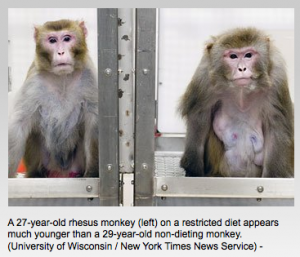by Dina Eliash Robinson
Scientists have repeatedly proven that reducing food intake on a long-term basis leads to longevity and better health. This was shown in early experiments with flies, earth-worms and in the 1930s, with rats and other rodents.
Speaking of the 1930s study, it came to the attention of my Great Uncle Sam, a slim and very active man who loved life, family and cooking. He immediately trimmed his portions, showed off his more wiry body in dapper duds and remained healthy till he died in his sleep at age 102.
A recently concluded 20-year study of this phenomenon by the University of Wisconsin-Madison, used rhesus monkeys living at the Wisconsin National Primate Research Center and found the same results. While all the primates being studied were fed a nutritious diet, half the group received 30 percent fewer calories, while the rest ate their usual quantities of food.
 The low-cal monkeys’ aging process was markedly slower and their mortality rate 37 percent less than those of the control group. The former also suffered less than half of the diseases (i.e. cancer, heart afflictions), age-related brain-shrinkage and loss of muscle tissue than the primates who ate larger quantities of food.
The low-cal monkeys’ aging process was markedly slower and their mortality rate 37 percent less than those of the control group. The former also suffered less than half of the diseases (i.e. cancer, heart afflictions), age-related brain-shrinkage and loss of muscle tissue than the primates who ate larger quantities of food.
If this doesn’t entice you to put less on your plate… Oh well, at least choose healthy fare and work it out in the gym.
